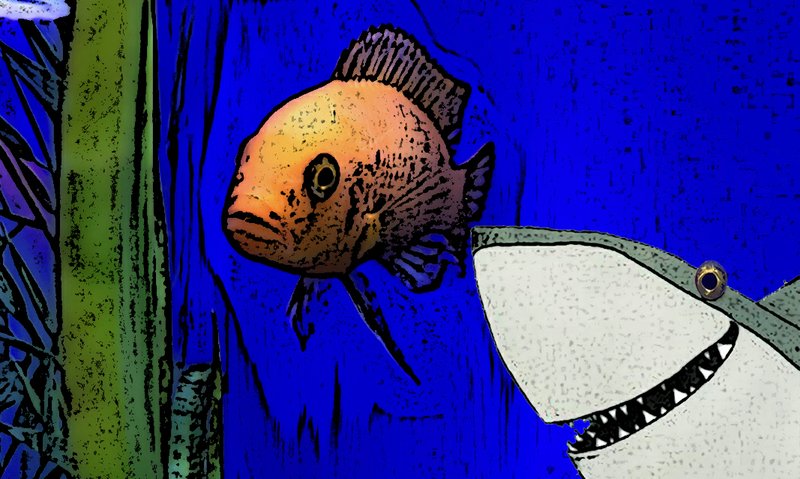The 1992 book Sharks Don't Get Cancer spawned a huge increase in shark hunting as people sought shark parts as a treatment for various malignancies.
In fact, sharks do get cancer, and multiple studies have found no evidence that using shark cartilage or other tissues is an effective treatment for any type of cancer.
WHERE WAS I?
It has long been known that sleep deprivation adversely affects cognitive function. We just don't seem to think as effectively when we don't get enough rest. But new research out of Michigan State University suggests the ill effects of too little sleep affect mental functioning in other ways.
The researchers looked at how sleep deprivation affects place-keeping — the ability to complete a series of steps without losing one's place, despite potential interruptions. "Sleep deprivation doubles the odds of making place-keeping errors and triples the number of lapses in attention, which is startling," said study author Kimberly M. Fenn.
"Our findings debunk a common theory that suggests that attention is the only cognitive function affected by sleep deprivation," added co-author Michelle Stepan, a doctoral candidate. "Some sleep-deprived people might be able to hold it together under routine tasks, like a doctor taking a patient's vitals. But our results suggest that completing an activity that requires following multiple steps, such as a doctor completing a medical procedure, is much riskier under conditions of sleep deprivation."
DOC TALK
Alopecia universalis: To be completely hairless. It's a rare autoimmune disorder in which all body hair is lost. The cause is unknown. There is no cure, although sometimes hair regrowth occurs on its own, years later.
Cataplexy: A sudden, brief loss of voluntary muscle tone and weakness, often triggered by strong emotions such as laughter, fear or stress. It is associated with narcolepsy, a chronic neurological disorder that affects the brain's ability to control sleep-wake cycles but occurs during waking hours.
Cachexia: A complex syndrome associated with an underlying illness, such as cancer or AIDS, that results in ongoing muscle and weight loss that cannot be entirely reversed with dietary supplementation.
MANIA, PHOBIA, MANIA
Catapedamania: An obsession with jumping from high places (one assumes if the place is too high, the mania is short-lived.)
Nephophobia: Fear of clouds
Aboulomania: Pathological indecisiveness
NEVER SAY 'DIET'
The Major League Eating record for spiral-cut, sliced holiday ham is 2 pounds and 10 ounces in five minutes, held by Bryan Miller. Miller later reported indigestion, but it was cured.
GOOD MEDICINE
Doctor: "You're in perfect health. You will live to be at least 65."
Patient: "But I am 65."
Doctor: "See, what did I tell you."
BODY OF KNOWLEDGE
Humans are born, on average, with approximately 5 million hair follicles, of which only 100,000 or so are on the scalp.
HYPOCHONDRIAC'S GUIDE
Morgellons disease is a very rare disorder characterized by the presence of fibers embedded in or erupting from unbroken skin or slow-healing sores. The phenomenon may be accompanied by sensations of crawling, biting or stinging on and in the skin.
The cause is unknown. Some doctors treat it as a psychiatric condition; others argue the symptoms are related to an infectious process in skin cells.
OBSERVATION
"Diets are for those who are thick and tired of it." — Mary Tyler Moore (1936-2017)
IG NOBEL APPRISED
The Ig Nobel Prizes celebrate achievements that make people laugh and then think. A look at real science that's hard to take seriously and even harder to ignore.
In 2016, the Ig Nobel Prize in Psychology went to a group of European researchers who asked 1,000 people between the ages of 6 and 77 about how often and how well they lied. They found that both lying frequency and proficiency rose during childhood, peaked in young adulthood and then declined through later adulthood.
Whether the data are believable — published in the journal Acta Psychology — depends on whether you believe the folks interviewed.
DON'T THINK TOO HARD ABOUT THIS
We've all heard the admonitions about how keeping mentally active boosts overall health and longevity. A new study suggests that busy brains might mean shorter lifespans and that excessive brain activity could be a risk factor for dementia.
Researchers documented the phenomenon across multiple species — from humans and mice to roundworms (!) — and said it appears people who live longer may have a regulatory gene that more effectively quiets unnecessary nerve activity.
They concede their findings appear counterintuitive and the full story in humans is likely to be much more complicated. So don't stop just yet taking those foreign language lessons, doing Sudoku and reading this column.
MED SCHOOL
Q: How many kinds of tonsils are there?
A: Four. The palatine tonsils are the ones seen at the back of the throat. But there are also lingual tonsils (base of the tongue), tubal tonsils (around the opening of the Eustachian tube in the nasopharynx, which is the upper part of the cavity behind nose and mouth) and adenoid tonsils (high up in the throat behind the nose). Altogether, these tonsils form Waldeyer's ring, which serves as a gatekeeper to all things entering the airways and digestive tract, grabbing pathogens and warding off diseases.
CURTAIN CALLS
An 89-year-old Florida man named Robert Dreyer died on his birthday when, while driving through the town of Viera, his car struck a fire hydrant for reasons unknown. The crash wasn't violent, and Dreyer reportedly exited the vehicle appearing unhurt.
However, as he stepped out, a 5-foot hole opened up beneath him. Authorities say the hole was likely created by the destruction of the hydrant and resulting uncontrolled water pressure, which was so great that it sprayed half a block.
Syndicated science writer Scott LaFee's column of health-related humor appears occasionally in Style.
Style on 12/16/2019
